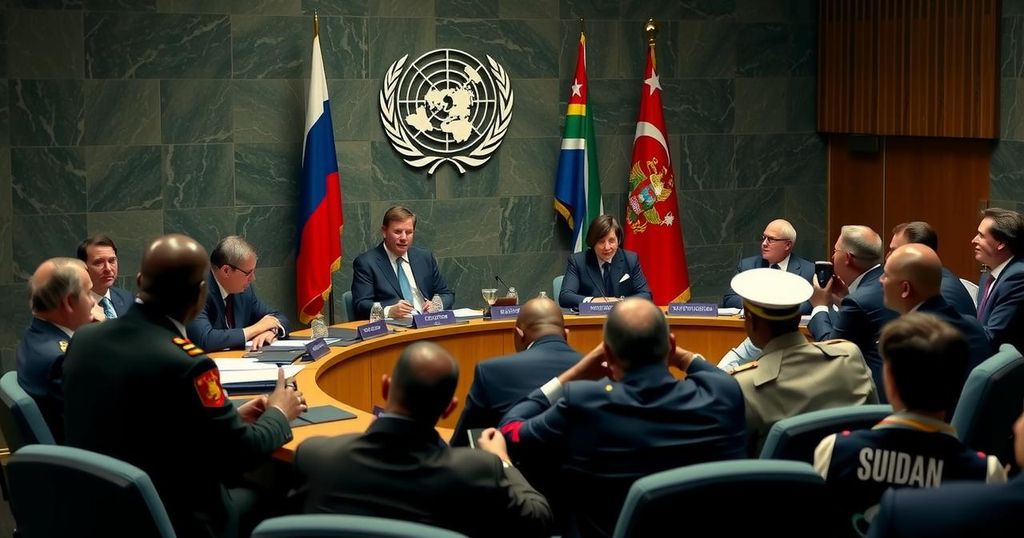UN Diplomacy in Crisis: Russia’s Veto Thwarts Sudan Ceasefire Efforts

Russia has vetoed a UN resolution backed by the UK and Sierra Leone aimed at securing a ceasefire in Sudan, prompting significant backlash from the UK and US. The ongoing conflict has created one of the world’s worst humanitarian crises, with millions displaced and thousands dead. The veto has highlighted tensions in the UN regarding foreign intervention and Sudanese sovereignty.
A significant diplomatic clash has erupted at the United Nations following Russia’s veto of a UK-supported resolution aimed at establishing a ceasefire in Sudan’s ongoing civil war. British Foreign Secretary David Lammy condemned the veto as a “disgrace,” citing the immense humanitarian crisis resulting from the conflict, which has displaced more than 11 million people and caused tens of thousands of deaths. The proposed resolution, co-sponsored by the UK and Sierra Leone, called for an immediate halt to hostilities and respectful adherence to existing civilian protection agreements, specifically addressing the violence perpetrated by the Rapid Support Forces (RSF).
While 14 members of the UN Security Council supported the resolution, Russia’s veto halted its progress. The Russian representative at the UN, Dmitry Polyanskiy, defended the action by asserting that the resolution disregarded Sudanese sovereignty and accused the UK of seeking to meddle in the region. In contrast, the US ambassador to the UN, Linda Thomas-Greenfield, criticized Russia for obstructing humanitarian efforts and advancing its own political agenda at the expense of Sudanese civilians.
Sudan’s ambassador to the UN, Al-Harith Idriss al-Harith Mohamed, indicated that omissions in the resolution concerning the classification of the RSF as “terrorists” and a condemnation of support for RSF from the United Arab Emirates were among the reasons for Sudan’s dissatisfaction. Both the Sudanese army and the RSF have faced accusations of violating human rights, raising concerns about potential war crimes as the international community witnesses the country’s tragic circumstances unfold.
The ongoing civil war in Sudan, which erupted in April 2022 between the Sudanese army and the Rapid Support Forces (RSF), has led to unprecedented levels of violence and humanitarian crises. Aid organizations have stated that the conflict has resulted in one of the worst humanitarian situations in the world, with millions lacking access to basic necessities, exacerbated by severe food shortages. The international community, particularly through the UN Security Council, has been under pressure to respond effectively to the crisis, although differing views among member states have complicated potential resolutions.
In summary, the UN Security Council’s failure to pass the proposed ceasefire resolution due to Russia’s veto underscores the complexities of international diplomacy regarding the Sudan crisis. The conflict has resulted in unparalleled humanitarian challenges, and continued obstruction by key nations raises urgent questions about the effectiveness of the UN’s role in addressing such crises. As calls for intervention intensify, the need for a constructive dialogue among nations is paramount to alleviate the suffering of the Sudanese people.
Original Source: www.bbc.co.uk








